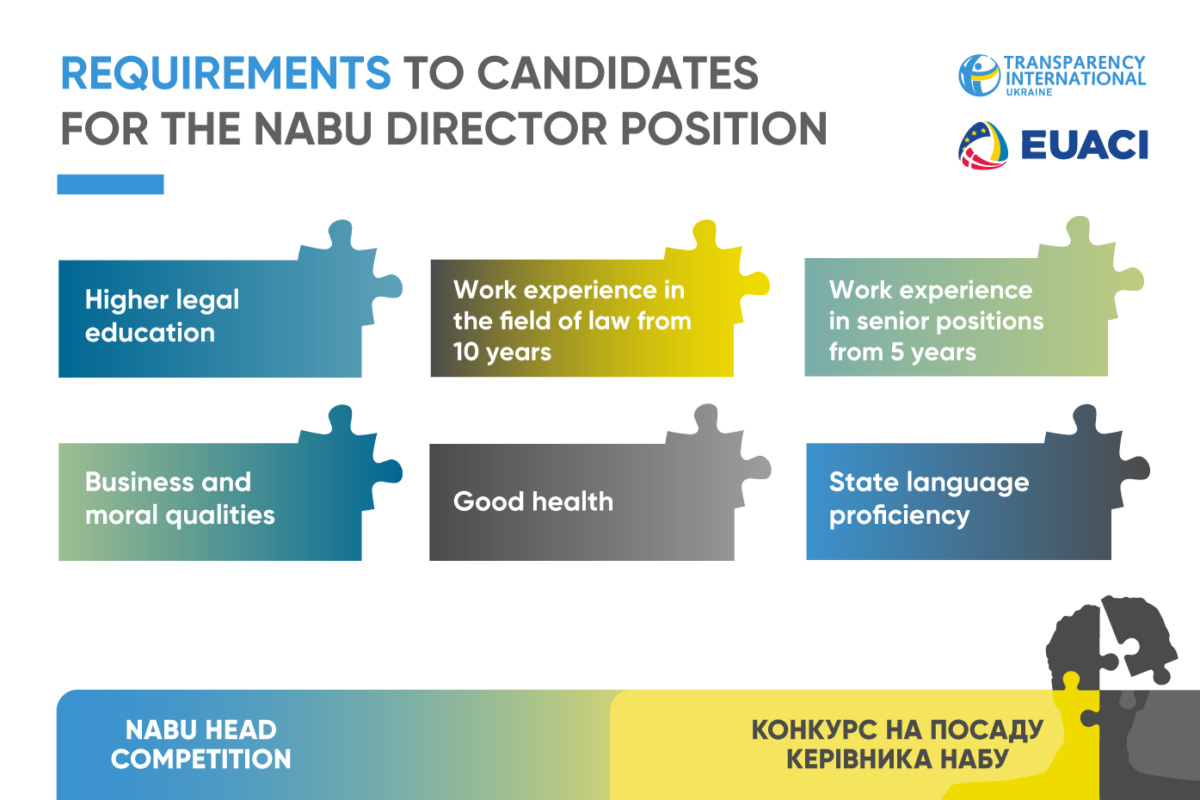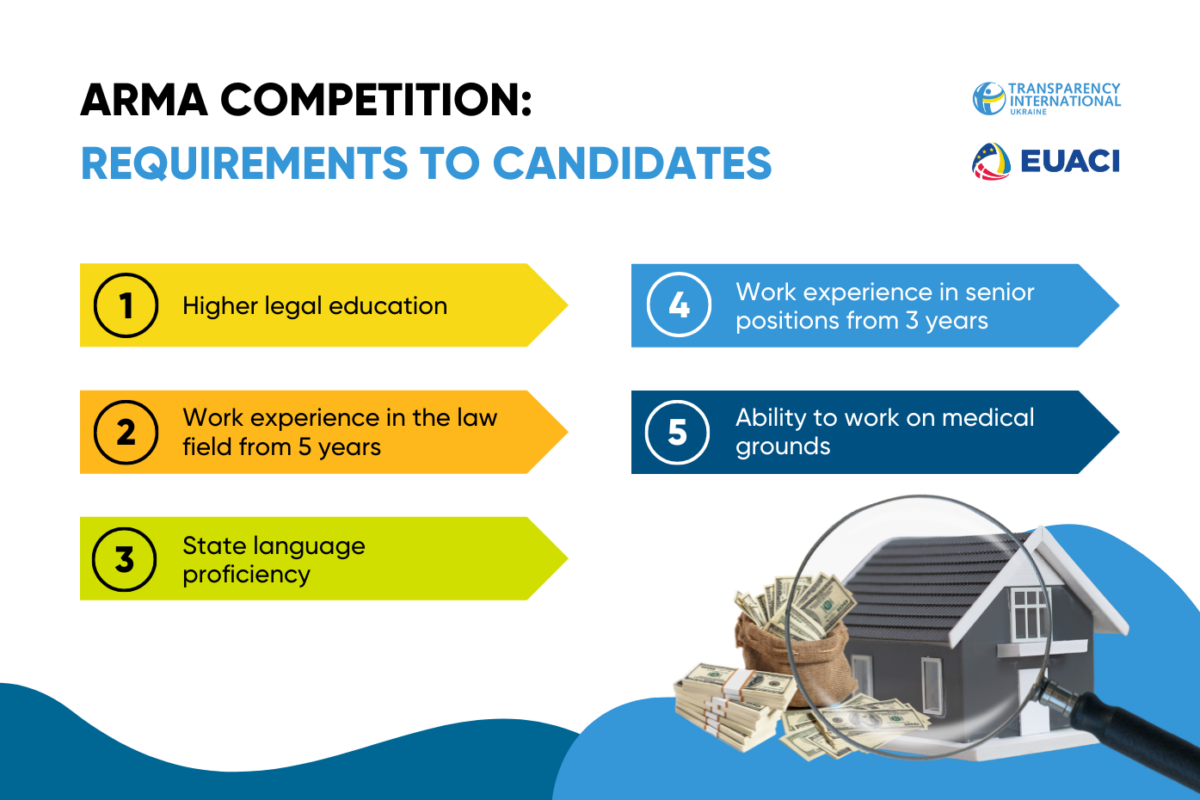

We all remember the long-awaited investigation of the attempt of MP Oleksandr Trukhin to bribe the police — right after a scandalous car accident.
Or another case concerning a record bribe of EUR 22 million, which ex-MP Maksym Mykytas offered to the mayor of Dnipro Borys Filatov.
In addition, after the Kyiv Court of Appeal overturned the decision to close the case on the first “KAC films,” there was hope that this proceeding would finally reach the court.
One of the reasons for the intensification of such investigations, of course, was the appointment of Oleksandr Klymenko to the post of the new head of the Specialized Anti-Corruption Prosecutor’s Office (SAPO).
But this appointment is just one of the small things for the full functioning of the anti-corruption ecosystem. Two more crucial anti-corruption institutions are still awaiting their leaders.
Investigations against MPs, judges, and ministers, work with confiscated Russian assets or other unique property seized in criminal proceedings are the result of the work of the entire system.
Competitions to two anti-corruption institutions are a chance for you to join this work. If, of course, you meet the requirements. You may lead one of them and strengthen the fight against corruption in Ukraine!
Thus, the admission of documents in two powerful competitions is currently underway:
- for the NABU Director (National Anti-Corruption Bureau)
- and the ARMA Head (Asset Recovery and Management Agency).
To a certain extent, these anti-corruption bodies can function without full-fledged leaders. However, only a fully staffed apparatus can ensure the most efficient and prompt strategic goals of their work.
Time shows that the lack of leaders does feel evident.
Leaders of anti-corruption bodies have the authority to make unique decisions and ensure the effective operation of these institutions. That is why the anti-corruption public community, including Transparency International Ukraine, is interested in these positions being held by the most competent and responsible people.
We continue to emphasize that the leaders of these institutions should be professional, honest, apolitical, and independent specialists. After all, they have a great responsibility, otherwise the effectiveness of the entire anti-corruption system will be at risk.
What do the leaders of the NABU and ARMA do?
The Director of the National Anti-Corruption Bureau is a key position not only for the anti-corruption system, but also for Ukraine as a whole.
It is this person who is responsible for the work of the Bureau, in particular, in monitoring the legality of the conducted operational-search measures, pre-trial investigation, as well as the observance of the rights and freedoms of persons.
This person also approves the NABU plans (prospective, current, and operational), appoints, and dismisses employees of the body, etc.
No less important is the role of the head of the Asset Recovery and Management Agency.
This body is directly related to the process of tracing Russian assets, which should end in confiscation.
The ARMA head oversees the difficult processes of finding such assets and managing them — the Agency should not only preserve them, but also maintain the value of the assets and look for new owners or managers.
What are the requirements to the candidates?
Until December 6, those who have a higher legal education, work experience in the field of law from 10 years, experience in senior positions from 5 years, the state language proficiency, high moral and business qualities, and are able to perform duties in good health can apply for the NABU Director.
The leader will not be appointed if the candidate has had contractual relations with parties in the past 2 years, falls under the law on lustration, is incapacitated or has a limited capacity, or has a criminal record, including for corruption.
The competition itself will consist of the following stages: testing for knowledge of legislation and general abilities, practical tasks and interviews — for compliance with the criteria of integrity and competence.
The commission will then select three candidates to submit for the consideration of the Prime Minister.
Moreover, on November 29, the acceptance of documents for the post of head of the Asset Recovery and Management Agency began, which will last until December 13.
Among the main requirements for the head of the Agency are: higher legal education, five years of experience in the field of law and three years of leadership experience in government bodies, local governments, legal entities in Ukraine or abroad or in international organizations, etc.
Furthermore, as in the case with the NABU competition, there are several restrictions regarding candidates for the post of the ARMA head — incapacity or limited capacity, outstanding criminal record, conviction, lack of Ukrainian citizenship, participation in the governing bodies of political parties and others.
The key stages of selection of the ARMA head are:
- the verification of compliance of documents with the requirements of the law;
- testing for professional knowledge and qualities;
- interviews with selected candidates;
- election of the most suitable candidate by open voting of the commission members.
Documents for the competition for the election of the NABU head should be sent by e-mail (details are in the list of documents for submission). At the same time, documents for the ARMA head competition should be submitted exclusively by mail to the address of the selection commission: 01008, Kyiv, 12/2 Hrushevskyi Street, (details can be found in the List of documents for submission).
Independent and qualified heads of anti-corruption bodies are a matter of European integration. After all, our partners should see that Ukraine is a worthy EU candidate who can effectively fight corruption.
This is especially important now because reconstruction during and after the war can create new corruption risks. And it is the anti-corruption institutions that will be assigned with the investigation and punishment for such blatant fraud.
We, Ukrainians, have embarked on an inevitable path to European democratic values, so we cannot afford to disrupt this process.








